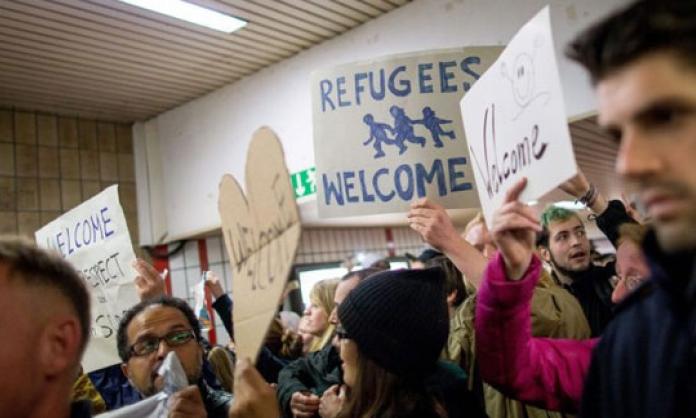In the face of the worst refugee crisis since World War Two, Europeans are coming out in unprecedented displays of solidarity and empathy. Fortress Europe, a central political project of the European ruling class, is cracking under the pressure of refugee resistance and international solidarity.
When Iceland's government offered an insulting and pitiful increase of 50 places to Syrian refugees, 10,000 people in protest offered their own homes as havens.
In Germany, authorities have complained that the volume of donations – toys, clothing, food – is unmanageable by the bureaucracies intended to search and clear contributions. An anti-Nazi punk song from the 1990s has been given a new lease on life at number one in the German music charts.
The solidarity is being organised from below. Schools, universities and sports clubs are collecting donations while trade unions have started offering free German lessons as a means of reaching out to and teaching newly arrived refugees about their rights at work.
A now famous scene from a Munich station, at which hundreds of Germans met a train load of refugees with cheering, singing and welcome signs, is no isolated phenomenon. At train stations across Germany and Austria refugees are welcomed with cheers and offerings of food, water and candy.
The news of an abandoned truck with 71 asphyxiated asylum seekers struck a chord in Austria. In response, 20,000 rallied outside parliament in Vienna chanting “No one is illegal!” and “Human rights are borderless!” Similar numbers have rallied in Germany, Sweden and France.
When authorities in Hungary refused to let refugees use public transport, up to 2,500 Austrians organised convoys of cars, buses and taxis to bring them across the border. Austrian train drivers have volunteered to work unpaid overtime to transport those without train tickets. In an attempt to stifle such “disorder” the Austrian government has threatened to close the border entirely.
This groundswell of solidarity and empathy is the result of the bravery and defiance of refugees themselves.
Scenes in Hungary in the past weeks are emblematic of the asylum seekers’ desperation and determination. On 1 September, authorities at a Budapest station refused people entry onto trains to Austria and Germany despite them having bought tickets. In response they occupied the station, shutting it down until they were finally allowed to board two days later.
Another train headed for the border was stopped to force people into a local refugee camp. Refugees protested, threw themselves on the railway tracks and refused food and water. The Guardian reports that thousands have broken out of camps in Bicske and Röszke.
These refugees confirm the well-known Palestinian proverb: “To exist is to resist”. As refugee activist Stefan Bornost told Red Flag from Germany, “The images of refugees resisting has humanised them. They are not just victims; they are fighting for their lives and for the lives of their children”.










